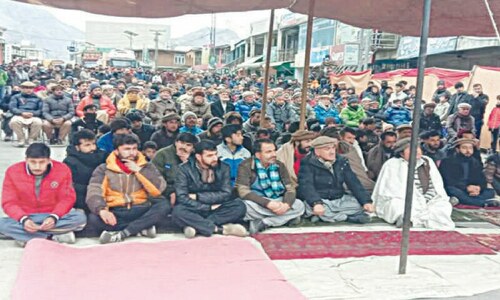GUJRAT: Uncertainty prevails in bureaucratic circles in Punjab following reports that the Buzdar government, with the backing of the prime minister, is set to go for a massive reshuffle of officers to 'improve governance in the province'.
A senior officer in the Punjab Civil Secretariat told Dawn on Tuesday that since most of the secretaries of the provincial departments, commissioners, deputy commissioners, etc have already been transferred on multiple occasions during the last 15 months, fresh shake-up might also not achieve the desired results.
Citing examples, he said the Higher Education Department secretary had been transferred for at least six times since the Buzdar government took the charge in the province, whereas secretaries of services and schools have been replaced four times each, secretaries of health, industries, excise, food and prosecution were changed three to four times during the period.
Similarly, he said, many divisional commissioners too had been changed at least two to four times. Dera Ghazi Khan commissioner being the worst case had been transferred four times, while those of Gujranwala, Rawalpindi and Multan were shuffled at least a couple of times.
Same was the case with the officers of police and other departments from top to bottom, he added.
Moreover, the officer said, the arrest of some senior bureaucrats in connection with the inquiries and cases instituted by the National Accountability Bureau (NAB) against them had also demoralised the bureaucracy which ultimately resulted in an overall ‘slowdown’ and poor governance in the province.
Another officer said that bracketing most of the efficient bureaucrats with the PML-N, and accusing bureaucracy in general of non-cooperation, some Pakistan Tehreek-i-Insaf leaders in the government used it an excuse for poor governance, particularly in Punjab.
He said it was just a lame excuse as in general the government officers did not have any political affiliations since they were public servants. Because of this approach, many efficient officers who remained on key posts during the last PML-N government had been sidelined as a “policy matter” in this set-up. He said the officers must be posted according to job requirement and keeping in view their capacity and efficiency.
Officers posted on various administrative posts in the provincial capital as well as at the district and tehsil level seem gripped by a fear of abrupt transfer. Most of them said though transfers were part of their job, they had never felt such insecurity about their tenure during the previous governments.
A BS-19 officer currently serving on a key administrative post in a district of central Punjab said on the condition of anonymity that since the present set-up was installed in the province, the bureaucracy was being blamed for the government’s own failures on various fronts, particularly for failing to deliver and introduce reforms.
“How the bureaucracy could deliver under fear and consistent criticism by the government functionaries,” he said, adding that this attitude led to a trust deficit between the government and bureaucrats in Punjab.
He said the trust gap could only be bridged through a strong political will, wisdom and policy of consistency regarding the transfer and posting of the officers posted on various administrative slots.
Another officer said the government had been failing in terms of delivering on governance and reforms because of lack of political will. He suggested that every officer should be given at least a year or two to bring substantial improvement in his or her sphere.
An officer posted as assistant commissioner said that he and his colleagues had been facing pressures, including that of abrupt transfer. He said they had to keep the ruling party lawmakers in their area happy by entertaining their mostly “illegitimate demands” and giving them favours in the official business.
He said had there been at least a clear policy with regard to security of tenure of the field administrative officers and senior bureaucrats the situation would have been better on governance front and introduction of reforms.
Published in Dawn, November 27th, 2019












































Dear visitor, the comments section is undergoing an overhaul and will return soon.